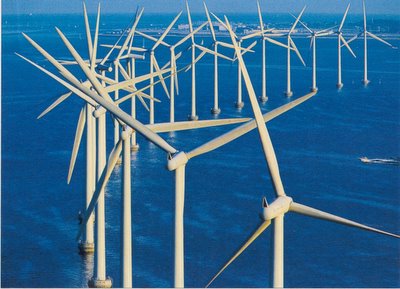
The Age, by Ross Gittins.
Melbourne, February 8, 2006
The rapid growth in the global economy is outstripping the ability of the planet's natural resources to sustain it, writes Ross Gittins.
The greatest economic, geopolitical and environmental event of our times is the rapid economic development of China, closely followed by India's. Its full ramifications are yet to dawn on us.
The bit we haven't twigged to is what it might do to the environment. Two hundred years ago, the countries of the West experienced an industrial revolution that eventually made them far, far richer than all the other countries of the world.
What's happening now is that China and India are going through their own industrial revolutions. But it's taking decades rather than centuries because they're able to pick up off the shelf the latest Western technology, as well as Western capital to finance massive investment in factories and infrastructure.
Since 1980, China's economy has been growing at a rate averaging about 9.5 per cent a year. That means it doubles in size every eight years. India's economy has been growing by only about 5.5 per cent a year, meaning that it doubles only every 13 years.
What makes this spectacular growth far more significant, however, is that China and India are the two most populous countries in the world, each with populations exceeding a billion. Between them, they account for almost 40 per cent of the world's population. By contrast, the rich countries of North America, Europe, Japan and Australasia account for less that 15 per cent.
What happens when two such huge countries sustain such rapid rates of economic growth? Well, for a start, you get a lot of growth in international trade, since both countries are pursuing export-oriented growth strategies. The Chinese are rapidly turning themselves into the globe's chief source of manufactured goods, while the Indians have already captured about half the global offshore outsourcing business.
This is the bit that's frightening people in America and Europe. All they see is low-skilled jobs migrating to Asia. But the next effect is the two countries' rapidly growing appetite for energy, food and raw materials, which perpetually threatens to outstrip supply and keeps upward pressure on prices.
According to a briefing paper on energy insecurity from the Lowy Institute, China is already the second largest consumer of energy in the world (after the United States), while India has moved into sixth place. Their joint share of world primary energy consumption has roughly doubled over the past two decades. Energy demand in both countries is also being boosted by rising incomes and growing urbanisation.
We're most conscious of the effect of demand on oil prices. By 2030, China is expected to be importing three-quarters of the oil it needs, while India imports more than 90 per cent. But oil accounts for only between a quarter and a third of the two countries' total energy consumption. Most of the rest comes from . . . coal. (Sounds of Aussie cash registers chinking.)
By contrast, both countries are largely self-sufficient in their consumption of food, even though the average Chinese consumes today twice as much grain - wheat, rice and corn - as in 1980, directly or in the form of livestock products. But it's hard to see how this self-sufficiency can last. If extended prosperity were again to double Chinese grain consumption per person - to roughly the European level - the equivalent of nearly 40 per cent of today's global grain harvest would be needed in China.
Then there's water. According to a special article in this year's State of the World report by the Worldwatch Institute in New York, China has just 8 per cent of the world's fresh water to meet the needs of 22 per cent of the world's population, while the World Bank has described India's water situation as "extremely grave".
Crop land in China and India is becoming less productive because of erosion, waterlogging, desertification and other forms of degradation. Beyond worries about what may happen to the scarcity and prices of energy and food, the world will need to grapple with a more fundamental constraint: the ability of Earth's ecological systems to support a continually growing global economy while absorbing vast quantities of pollution.
The institute asks: "As China and India add their surging consumption to that of the United States, Europe and Japan, the most important question is this: can the world's ecosystems withstand the damage - the increase in carbon emissions, the loss of forests, the extinction of species - that are now in prospect?"
I doubt it. The concept of a country's "global footprint" shows what its economy needs from nature, measured as the number of global hectares of land and water, to provide its material inputs and accommodate its wastes. The US, with less than 5 per cent of the world's population, requires a remarkable quarter of global biocapacity to support itself. Europe and Japan, with 10 per cent of the world's population, require another quarter. At present, China and India, with almost 40 per cent, require another quarter.
What happens if the Chinese and Indian economies double in the next decade? Remember that China already uses 26 per cent of the world's crude steel, 32 per cent of the rice, 37 per cent of the cotton and 47 per cent of the cement.
The institute concludes: "Global ecosystems and resources are simply not sufficient to sustain the current economies of the industrial West and at the same time bring more than 2 billion people into the global middle class through the same resource-intensive development model pioneered by North America and Europe.
"Limits on the ability to increase oil production, shortages of fresh water, and the economic impacts of damaged ecosystems and rapid climate change are among the factors that make it impossible to continue current patterns on such a vastly larger scale. Humanity is now on a collision course with the world's ecosystems and resources. In the coming decades, we will either find ways of meeting human needs based on new technologies, policies and cultural values, or the global economy will begin to collapse."
Ross Gittins is a staff columnist with The Age.






















